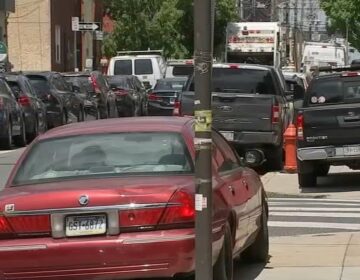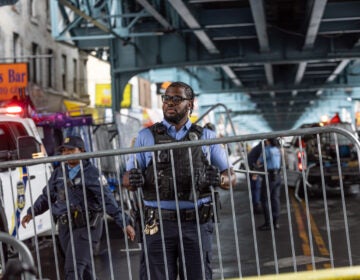For three recent weeks, Northwest Philly was the deadliest section of the city
A thud at the front of the house stirred Janie Wright from her sleep.
One of her sons, also residing at the East Germantown property, thought his 72-year-old mother might have fallen out of bed.
She hadn’t.
Instead, the early morning wake-up call came courtesy of something far more tragic. After being shot in the chest, a young man had lost control of his 1990s Oldsmobile and smacked into the brick façade of Janie Wright’s East Rittenhouse Street home. He died at Albert Einstein Medical Center 30 minutes later.
Impact of crime
According to police, the 25-year old victim, whose name has not been released because the incident remains under investigation, was driving down the 5800 block of Baynton Street just after 3 a.m. After stopping, another man pulled up in an SUV alongside him and opened fire.
It’s still unclear what exactly triggered the episode. Whatever the reason, though, William Wright, another one of Janie’s sons, was sure the act was senseless.
“Ain’t nothing worth killing nobody,” he said the day of the murder, as he was moving his mother out so repairs could be made to the home.
The Feb. 13 incident was the city’s 47th murder in 2012, a year that is already proving nearly as deadly as years past. As of Monday, a total of 60 murders were on the books. There were 65 this time last year.
The city’s deadliest section
Perhaps more troubling is that this particular murder capped a three-week span that began Jan. 23 and ended with nine people being killed in or near Germantown and West Oak Lane. Just two cases have resulted in arrests so far.
For the better part of a month, Northwest Philadelphia was the most violent section of the city, but why?
Local police know murder, but they can’t say why there have been so many lately.
Nearly half of the city’s murders during that stretch occurred in either Germantown or West Oak Lane. Two were murder-suicides.
In the city’s 14th Police District, which covers parts of Chestnut Hill and Mt. Airy and beyond, there were three murders in eight days. That includes the one on Baynton Street.
Capt. Joel Dales had few words when asked about the spate. “Shocking” quickly came to mind. In 2011, his district recorded just two murders between Jan. 3 and Feb. 3.
“It’s unusual,” Dales offered, “but not impossible.”
None of the killings appear to be related, he said, noting that police believe the shooting on Baynton Street originated from events that transpired in North Philadelphia.
The remaining two shootings are believed to be the result of neighborhood beefs.
“That can happen anywhere,” said Dales.
Police have made an arrest in one of those cases. Adrian McCall, 32, was taken into custody late last month and charged with killing his neighbor, Lonnie Workman, on the 5500 block of Blakemore St., according to police.
Homicides appear to be unrelated
Capt. Verdell Johnson, who heads the 39th Police District, also said that none of the murders in his district during the three-week stretch are connected.
The district, which covers Southwest Germantown, East Falls and parts of North Philadelphia, had four murders in 17 days — two in January and two in February.
“I can’t really explain why or how,” said Johnson, who joined the district shortly after the New Year. “We’re out there actively trying to prevent what we can from a police perspective.”
Johnson did offer that January has been an “extremely violent” month for the past few years and that violence typically “tails off” in February. He said it’s possible that this year’s warm winter led to more violence on the city’s streets with fewer days of the kind of biting cold that keeps folks inside.
In 2011, though, there were three murders in February, he said, noting that “logic doesn’t always prevail in our profession.”
Police believe at least two of the murders stemmed from arguments. A third was a murder-suicide.
Officers have arrested one man in connection to a Feb. 9 murder on the 5200 block of Marion St. They are still searching for the shooter in that case, believed to be Anthony Baker. A reward has been offered in that case.
The remaining two murders occurred in the 35th Police District. One arrest has been made there.
Concerned residents
While police are unable to pinpoint the reasons for the murder rates in their districts, residents did offer some more general insight into the statistics.
Germantown resident Greg Paulmier, who lives in the city’s 12th Ward, where four of the nine murders occurred, pointed first to the economy.
“When the economy isn’t doing well, people don’t do well,” said Paulmier, who has lived in the neighborhood for more than 50 years. “We live in very unhealthy times as a result of employment issues.”
The result, he said, is more crime.
Paulmier said he also thinks, though, that the decision to take his neighborhood out of the 14th Police District’s purview and into the 39th’s several years ago continues to have a negative impact. He characterized the 39th as a hectic district with a lot of problems.
“The police are overrun with problems throughout the district. That has hurt everyone, including police morale. They’re tapped out,” said Paulmier. “When they’re up in our area, they’ve gotten off of the stressful part of the district.”
Paulmier added that he has noticed a dip in police presence, but doesn’t think his neighborhood is less safe these days.
“It’s pretty much the way it’s always felt,” he said.
Fear for safety
A resident on the 2400 block of 75th Ave. in West Oak Lane, who asked not be identified for fear of retaliation, felt decidedly different, though, when asked about crime and safety in the neighborhood.
“Lot of crime, little bit of safety,” said the resident, who lives just around the corner from one of the murder sites. “Just about every other week someone gets shot. It used be a nice neighborhood.”
The long-time resident said the neighborhood’s overall mentality has changed. Now, the smallest thing can get you killed.
“It could be anything. The way someone looks at you on the street. There’s no particular reason,” said the resident.
And neighbors are afraid to talk to police about crime, even if they’re a witness.
Police: Numbers don’t make an area unsafe
For his part, Dales said he hasn’t necessarily witnessed an elevated sense of concern among neighbors, though some have asked him about the murders.
Johnson said the statistics in his district aren’t an indication of the neighborhood being more or less safe. Regardless, he’s taking the incidents seriously.
“Having one [murder] in a short period is too much for us,” said Johnson.
Unfortunately, detectives with the city’s Homicide Unit, which is responsible for investigating all murders, will be logging more than a short investigative period in Northwest Philadelphia.
WHYY is your source for fact-based, in-depth journalism and information. As a nonprofit organization, we rely on financial support from readers like you. Please give today.
















